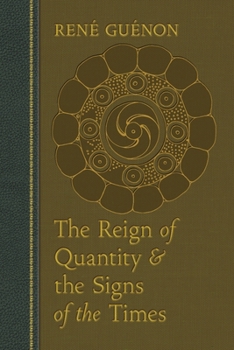The Reign of Quantity and the Signs of the Times
(Book #3 in the Critique du monde moderne Series)
Select Format
Select Condition 
Book Overview
Ren Gu non (1886-1951) was one of the great luminaries of the twentieth century, whose critique of the modern world has stood fast against the shifting sands of intellectual fashion. His extensive writings, now finally available in English, are a providential treasure-trove for the modern seeker: while pointing ceaselessly to the perennial wisdom found in past cultures ranging from the Shamanistic to the Indian and Chinese, the Hellenic and Judaic, the Christian and Islamic, and including also Alchemy, Hermeticism, and other esoteric currents, they direct the reader also to the deepest level of religious praxis, emphasizing the need for affiliation with a revealed tradition even while acknowledging the final identity of all spiritual paths as they approach the summit of spiritual realization.
The Reign of Quantity and the Signs of the Times is Ren Gu non's most prophetic work. Having seen his telling analysis of Western culture, The Crisis of the Modern World, swiftly overtaken by events, he based this his final and most profound critique squarely on changeless metaphysical principles. He exposes with his fabled clarity the precise nature of the modern deviation, devoting special attention to the part played by modern philosophy and science (with their accompanying notions of progress and evolution) in the formation of the industrial and democratic society that we now regard as "normal." He sees history as a descent from Form (or Quality) toward Matter (or Quantity). But following after the Reign of Quantity (modern materialism and the "rise of the masses"), Gu non predicts a reign of "inverted quality" just before the end of the age: the triumph of the "counter-initiation" the kingdom of Antichrist. Although Gu non bases his critique on "abstract" principles, his examples are satisfyingly concrete: his remarks on "the degeneration of coinage" could easily be updated to include the transformation of money into electronically-stored digital information; his treatment of "the significance of metallurgy" as regards its occult dangers points directly to our own well-founded fear of such man-made elements as plutonium; and his chapter on the "cracks in the Great Wall" gives solid metaphysical grounding to our twenty-first century demonology, including the UFO phenomenon. This text is considered the magnum opus among Gu non's works of civilizational criticism, as is Symbols of Sacred Science among his studies on symbols and cosmology, and Man and His Becoming according to the Vedanta among his more purely metaphysical works.
Related Subjects
Contemporary Fiction Literature & Fiction Philosophy Religion Religion & Spirituality




